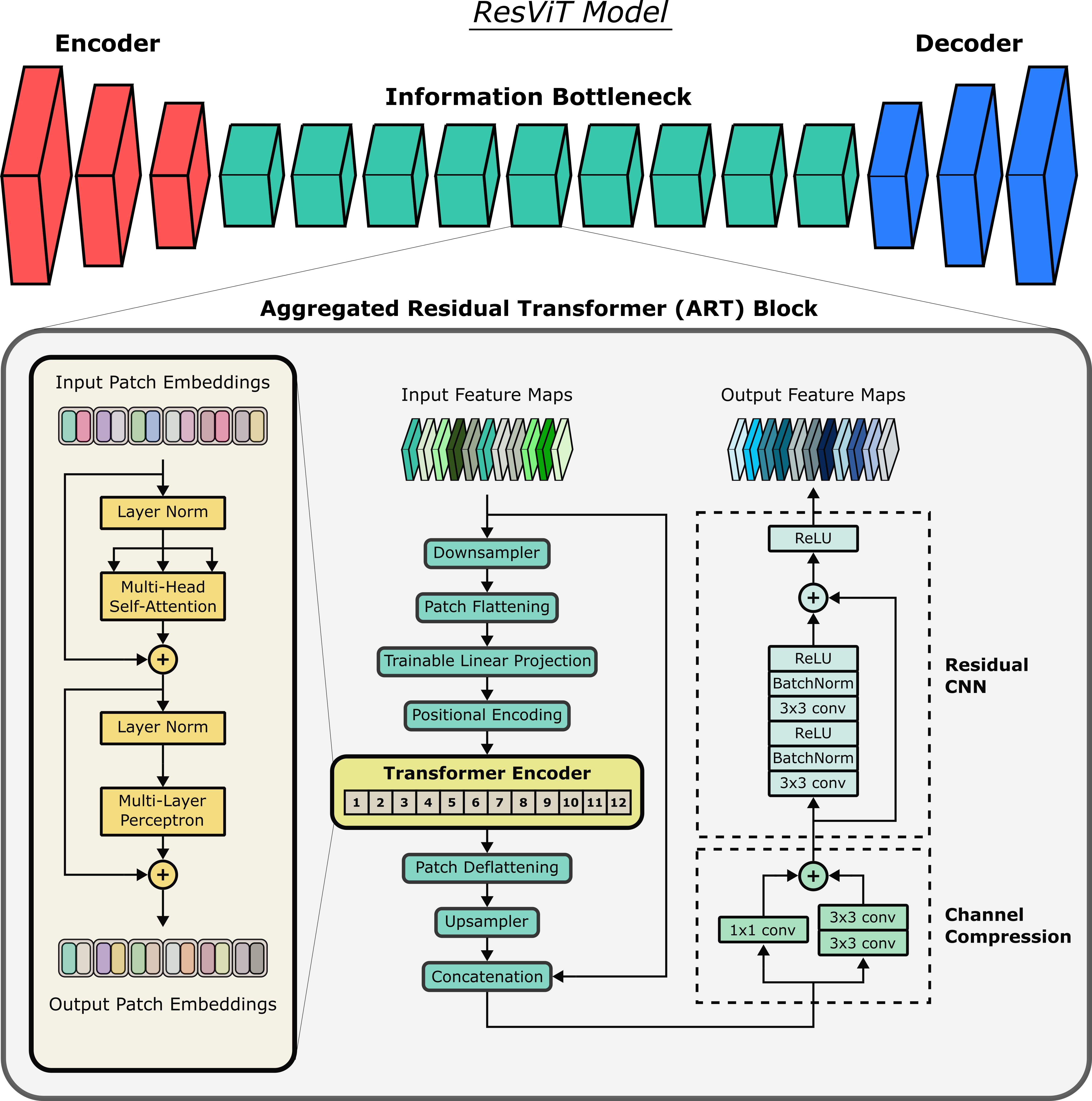Official Pytorch Implementation of Residual Vision Transformers(ResViT) which is described in the following paper:
O. Dalmaz, M. Yurt and T. Çukur, "ResViT: Residual Vision Transformers for Multimodal Medical Image Synthesis," in IEEE Transactions on Medical Imaging, vol. 41, no. 10, pp. 2598-2614, Oct. 2022, doi: 10.1109/TMI.2022.3167808.
python>=3.6.9
torch>=1.7.1
torchvision>=0.8.2
visdom
dominate
cuda=>11.2
h5py
ml_collection
scipy>=1.3.0
scikit-image
- Clone this repo:
git clone https://github.com/icon-lab/ResViT
cd ResViTwget https://storage.googleapis.com/vit_models/imagenet21k/R50+ViT-B_16.npz &&
mkdir ../model/vit_checkpoint/imagenet21k &&
mv {MODEL_NAME}.npz ../model/vit_checkpoint/imagenet21k/R50-ViT-B_16.npzTo reproduce the results reported in the paper, we recommend the following dataset processing steps:
Sequentially select subjects from the dataset. Apply skull-stripping to 3D volumes. Select 2D cross-sections from each subject. Normalize the selected 2D cross-sections before training and before metric calculation. You should structure your aligned dataset in the following way:
/Datasets/BRATS/
├── T1_T2
├── T2_FLAIR
.
.
├── T1_FLAIR_T2
/Datasets/BRATS/T2__FLAIR/
├── train
├── val
├── test
Note that for many-to-one tasks, source modalities should be in the Red and Green channels. (For 2 input modalities)
It is recommended to pretrain the convolutional parts of the ResViT model before inserting transformer modules and fine-tuning. This signifcantly improves ResViT's.
For many-to-one tasks:
python3 train.py --dataroot Datasets/IXI/T1_T2__PD/ --name T1_T2_PD_IXI_pre_trained --gpu_ids 0 --model resvit_many --which_model_netG res_cnn
--which_direction AtoB --lambda_A 100 --dataset_mode aligned --norm batch --pool_size 0 --output_nc 1 --input_nc 3 --loadSize 256 --fineSize 256
--niter 50 --niter_decay 50 --save_epoch_freq 5 --checkpoints_dir checkpoints/ --display_id 0 --lr 0.0002
For one-to-one tasks:
python3 train.py --dataroot Datasets/IXI/T1_T2/ --name T1_T2_IXI_pre_trained --gpu_ids 0 --model resvit_one --which_model_netG res_cnn
--which_direction AtoB --lambda_A 100 --dataset_mode aligned --norm batch --pool_size 0 --output_nc 1 --input_nc 1 --loadSize 256 --fineSize 256
--niter 50 --niter_decay 50 --save_epoch_freq 5 --checkpoints_dir checkpoints/ --display_id 0 --lr 0.0002
For many-to-one tasks:
python3 train.py --dataroot Datasets/IXI/T1_T2__PD/ --name T1_T2_PD_IXI_resvit --gpu_ids 0 --model resvit_many --which_model_netG resvit
--which_direction AtoB --lambda_A 100 --dataset_mode aligned --norm batch --pool_size 0 --output_nc 1 --input_nc 3 --loadSize 256 --fineSize 256
--niter 25 --niter_decay 25 --save_epoch_freq 5 --checkpoints_dir checkpoints/ --display_id 0 --pre_trained_transformer 1 --pre_trained_resnet 1
--pre_trained_path checkpoints/T1_T2_PD_IXI_pre_trained/latest_net_G.pth --lr 0.001
For one-to-one tasks:
python3 train.py --dataroot Datasets/IXI/T1_T2/ --name T1_T2_IXI_resvit --gpu_ids 0 --model resvit_one --which_model_netG resvit
--which_direction AtoB --lambda_A 100 --dataset_mode aligned --norm batch --pool_size 0 --output_nc 1 --input_nc 1 --loadSize 256 --fineSize 256
--niter 25 --niter_decay 25 --save_epoch_freq 5 --checkpoints_dir checkpoints/ --display_id 0 --pre_trained_transformer 1 --pre_trained_resnet 1
--pre_trained_path checkpoints/T1_T2_IXI_pre_trained/latest_net_G.pth --lr 0.001
For many-to-one tasks:
python3 test.py --dataroot Datasets/IXI/T1_T2__PD/ --name T1_T2_PD_IXI_resvit --gpu_ids 0 --model resvit_many --which_model_netG resvit
--dataset_mode aligned --norm batch --phase test --output_nc 1 --input_nc 3 --how_many 10000 --serial_batches --fineSize 256 --loadSize 256
--results_dir results/ --checkpoints_dir checkpoints/ --which_epoch latest
For one-to-one tasks:
python3 test.py --dataroot Datasets/IXI/T1_T2/ --name T1_T2_IXI_resvit --gpu_ids 0 --model resvit_one --which_model_netG resvit
--dataset_mode aligned --norm batch --phase test --output_nc 1 --input_nc 1 --how_many 10000 --serial_batches --fineSize 256 --loadSize 256
--results_dir results/ --checkpoints_dir checkpoints/ --which_epoch latest
You are encouraged to modify/distribute this code. However, please acknowledge this code and cite the paper appropriately.
@ARTICLE{9758823,
author={Dalmaz, Onat and Yurt, Mahmut and Çukur, Tolga},
journal={IEEE Transactions on Medical Imaging},
title={ResViT: Residual Vision Transformers for Multimodal Medical Image Synthesis},
year={2022},
volume={41},
number={10},
pages={2598-2614},
doi={10.1109/TMI.2022.3167808}}
For any questions, comments and contributions, please contact Onat Dalmaz (onat[at]ee.bilkent.edu.tr)
(c) ICON Lab 2021
